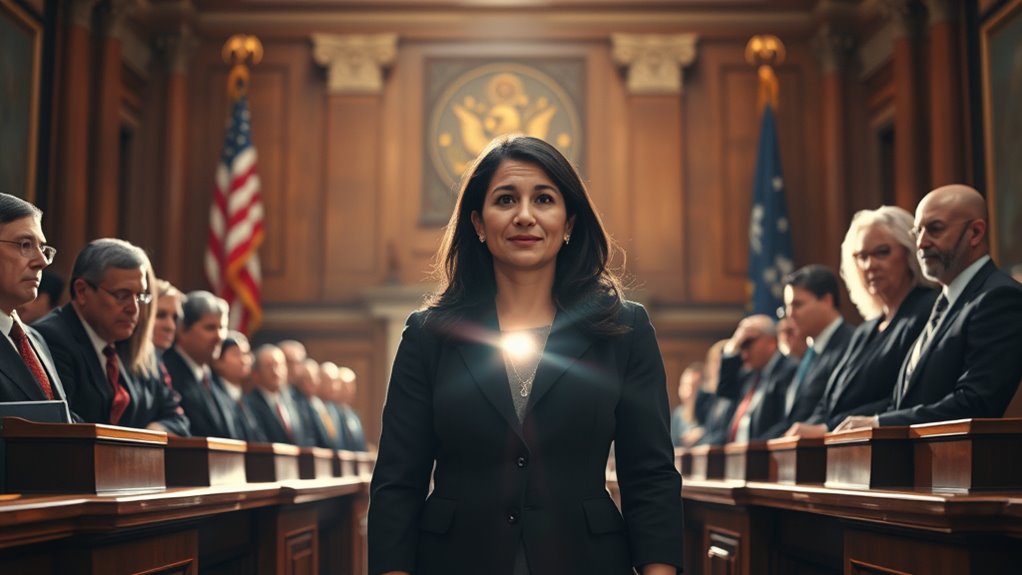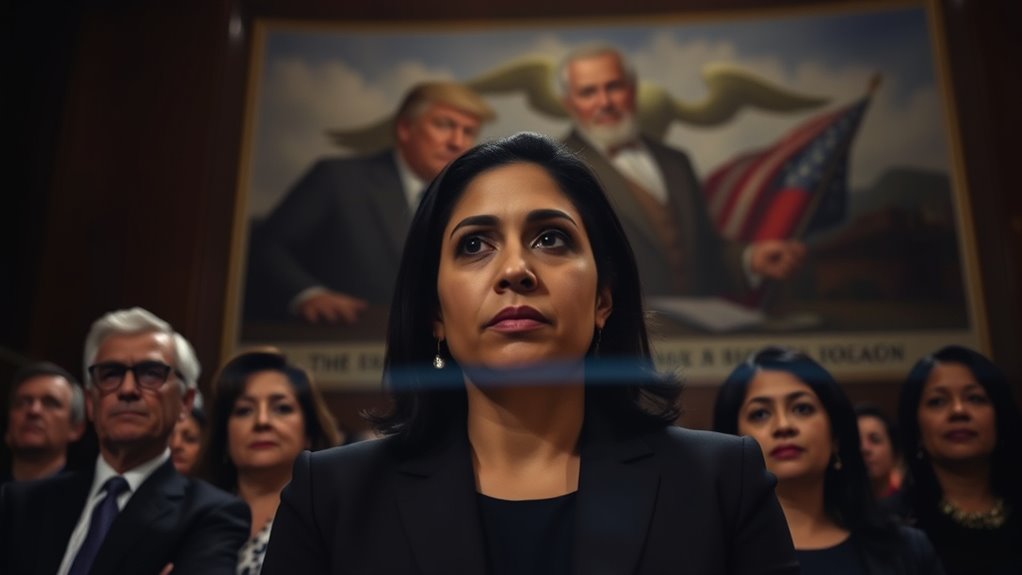Tulsi Gabbard's path to becoming the Director of National Intelligence just got a boost after a Senate panel backed her in a nail-biting 9-8 vote. Partisan tensions ran high, with Democrats opposing her while Republicans showed division. Despite past controversies and lack of formal intelligence experience, pressure from GOP supporters helped sway some votes. The stakes are high, and her fate now lies in the full Senate's hands. There's more to uncover about this intense nomination process.
Key Takeaways
- Tulsi Gabbard's nomination for Director of National Intelligence advanced with a narrow 9-8 vote from the Senate Intelligence Committee.
- All Democrats opposed Gabbard, while Republican support was split, influenced by a pressure campaign.
- Key swing votes, particularly from Senator Todd Young, will be critical for her confirmation in the full Senate.
- Gabbard's past controversies and lack of formal intelligence experience raise concerns among lawmakers despite her military background.
- Her recent policy shift on FISA demonstrates a strategic attempt to align with Republican senators and gain support.

As Tulsi Gabbard's nomination for Director of National Intelligence advances, the Senate Intelligence Committee's recent 9-8 vote reveals a tumultuous path marked by partisan divides and strategic shifts. You're witnessing firsthand the complexities of Gabbard's journey through a committee where all Democrats opposed her, while Republicans showed division until a pressure campaign turned the tide. The closed-door nature of these meetings adds to the intrigue surrounding her nomination, as sensitive discussions often remain hidden from public view.
Tulsi Gabbard's nomination for Director of National Intelligence faces partisan divides, strategic shifts, and a complex path forward.
The committee's composition plays a crucial role in this drama. With Sen. Tom Cotton leading the charge, the dynamics between party lines are palpable. Gabbard's nomination now heads to the full Senate, but without a scheduled vote, the suspense builds. She needs near-unanimous support from GOP senators to secure confirmation, a tall order given the strong Democratic opposition. Key swing votes, like that of Senator Todd Young, have emerged as pivotal in deciding her fate, especially after initial hesitance.
Gabbard's past controversies complicate her nomination further. Critics often point to her meeting with Syrian President Bashar Assad, which some argue legitimized a dictator. Her previous support for Edward Snowden and her echoing of Russian propaganda, particularly regarding Ukraine, have raised eyebrows among lawmakers. With no formal intelligence experience, Gabbard's military background as a lieutenant colonel in the National Guard only partially mitigates concerns. Gabbard's nomination cleared the Senate Intelligence Committee is a recent development that signals the ongoing contention surrounding her candidacy.
Interestingly, Gabbard's flip-flops on policy, particularly regarding Section 702 of FISA, reflect her attempt to navigate these choppy waters. Once a vocal opponent, she now supports it, citing reforms aimed at protecting civil liberties. This shift appears calculated to reassure GOP senators wary of her previous stances on surveillance. It's a clear indication of how her policy evolution aligns with her nomination aspirations.
The pressure from Trump supporters, including influential figures like Elon Musk, adds another layer of complexity. By labeling dissenting Republican senators as "deep-state puppets," this campaign seeks to unify GOP backing for Gabbard.
As you watch this unfold, the interplay of partisan loyalty and strategic maneuvering becomes evident. Gabbard stands at a crossroads, balancing her controversial past with a future that hinges on the support of a divided Senate. The stakes couldn't be higher as her path to the intelligence throne remains uncertain, with each vote potentially shaping the future of national security.
Frequently Asked Questions
What Is Tulsi Gabbard's Political Background and Experience?
Tulsi Gabbard's political background is quite impressive.
You'd see she started in the Hawaii State Legislature at just 21, later serving in the U.S. House representing Hawaii's 2nd District.
Her military service in the Army National Guard adds to her credentials, along with her work on key committees.
She made headlines during her presidential run and has shifted party affiliations, illustrating her dynamic political journey and evolving viewpoints.
Who Are the Key Opponents in Gabbard's Senate Race?
In the political arena, opponents often loom like shadows, challenging every move.
In Tulsi Gabbard's Senate race, key adversaries include Mitch McConnell, who voted against her due to alignment with Trump's nominees, and Democrats like Dick Durbin and Elissa Slotkin, who criticized her past actions and lack of intelligence experience.
While some Republicans initially hesitated, figures like Susan Collins later supported her, highlighting the complex dynamics at play in her nomination process.
What Are the Main Issues Gabbard Focuses on in Her Campaign?
In her campaign, you'll notice Tulsi Gabbard emphasizes several key issues. She criticizes U.S. military interventions, advocating for a focus on domestic priorities instead.
Gabbard supports criminal justice reform, financial reform, and environmental policies while taking conservative stances on social issues like gun control and abortion. She also champions LGBTQ rights, though her positions have evolved.
How Does Gabbard's Stance Differ From Other Senate Candidates?
Gabbard's views vividly vary from other Senate candidates.
While many focus on traditional tactics and treaties, you'll find her daringly delving into controversial conversations, like her past relations with Assad and her unique take on NATO's role in Ukraine.
Additionally, her military background shapes her stance on foreign policy, setting her apart.
Unlike typical candidates, she champions whistleblower rights and emphasizes addressing China's cyber threats, making her approach refreshingly distinct.
What Are the Implications of Gabbard's Potential Senate Win for National Politics?
If Gabbard wins a Senate seat, it could significantly reshape national politics.
You'd see a shift in party dynamics, as her transition from Democrat to Republican may influence other moderates.
Her focus on national security, particularly regarding China and drug trafficking, could change legislative priorities.
Additionally, her unique perspective might foster bipartisan collaboration or deepen divisions.
Ultimately, her presence could redefine the Republican agenda and impact future political movements.
Conclusion
In the end, Gabbard's gamble pays off as the Senate panel pivots, paving her path to power. With her intelligence and tenacity, she's tantalizingly close to claiming the coveted intel throne. As the political landscape shifts, supporters and skeptics alike stand on the edge of their seats, eagerly awaiting the unfolding drama. Will she seize the moment? Only time will tell, but one thing's for sure: Gabbard's journey is just beginning, and it's bound to be breathtaking.









